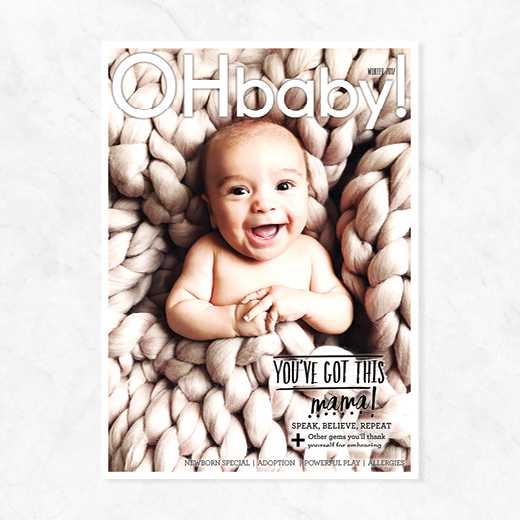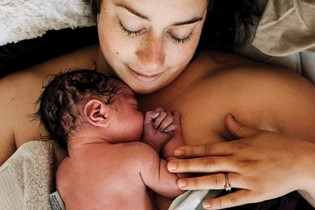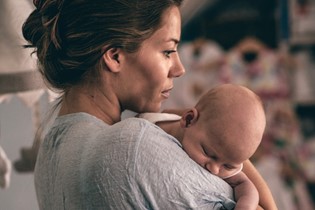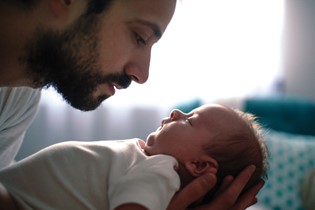Timeless wisdom: advice for new parents

Hindsight paints an illuminating picture. What would you do differently and what do you wish you knew? Miriam McCaleb asks friends and co-workers in the child development field for the parenting advice they would give their younger selves.
Once a parent, always a parent. Whether your babies are teenagers, are parents themselves, or if they are no longer alive, being a parent doesn’t ever stop. It’s the job we cannot quit.
With this in mind, it’s worth being a conscious parent when we make decisions about how our day-to-day interactions with baby are going to go. Equally important: in a world where EVERYBODY has opinions about parenthood (Pick him up! Put him down!), we need to be cautious about whose advice we take.
With this in mind, I have surveyed a range of my friends/colleagues from the world of child development (I’ve christened them ‘frolleagues’), asking them what they would have told themselves, back when they were caring for their own little babies. The things they wish they’d known, the things they’re so glad they did. I hope you will enjoy their collective wisdom as much as I have.
I begin by inviting you to disregard everything I have just said and all that is yet to come. Many of the expert frolleagues I talked to emphasised the need to honour your own inner wisdom. Trust yourself. Listen to your intuition. Marie Black has been involved in supporting young families in the Hurunui District (where she’s now deputy mayor!) for almost 25 years. She says “Follow your head and your heart and let those intuitive thoughts guide you to: Do nothing. Seek support. Care for self. Or to cuddle and take time for your infant/child if that’s what should be done”.

Hearts that hear
Meanwhile, from somewhere near Thames came achingly beautiful sentiments and spookily similar language from author, teacher and kaumatua Pennie Brownlee. She wrote “If I could send a message to that new mum 43 years ago, I would tell her to ‘Put your doubts aside and feel and listen. Listen with the ears of your heart, listen with the eyes of your heart. You’ll know how to read what baby is telling you, because when you listen with all of your heart you will feel what is right’”. Of course, that ability to sense what is right, that important intuitive style of care needs a little nurture of its own. Our inner voice can require space and quiet to let itself be heard. This leads to another of the themes that cropped up from ourexperts – the need to carve out time and focus for infant care.
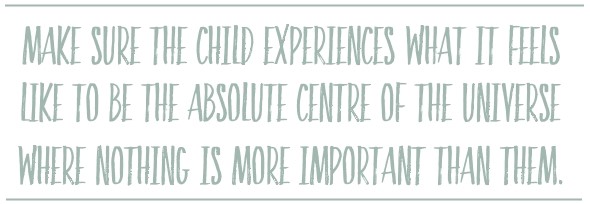
Nathan Mikaere-Wallis is a well-known and popular speaker around issues pertaining to parenting. His kids – both biological and foster – are now grown, ranging in age from 17 to 24, and he has joyfully joined the ranks of grandparenthood. On the subject of making room to focus on parenting, Nathan said “Full attention, stop multi-tasking ... make sure the child experiences what it feels like to be the absolute centre of the universe where nothing is more important than them. You don’t answer the phone, you don’t answer the text, you don’t answer the door. Even if it’s only a five minute period you put aside and say ‘Nothing is more important than you’. Every child should experience that”.
Never has that counsel been more important. Technology and the constant temptation of social media are a fairly new phenomenon, but distractions have always existed. While I concede that children must, at some point, learn to share their parents’ focus, I would challenge everyone to try Nathan’s five-minute recipe of ‘Nothing is more important than you’. Then try another five minutes. How did that feel? What did that extra focus enable you to experience, alongside your child? These focussed pockets of parenting create a space to make a little relationship magic, and my friend and mentor (dare I call her my frentor?) Patricia Champion, MBE, shares a simple and practical way to achieve this. Dr Champion founded the Champion Centre in the 1970s, and since then they have provided multi-disciplinary early intervention services to infants and young children with significant disabilities, and their families.
All the feelings
When Patricia was a young mother herself, she instinctively understood the benefits of enjoying her babies in an all-encompassing way: “Let yourself experience your baby with ALL your senses. The smell of her, the feel of her soft skin, the noises she makes”. Dr Champion knew, somehow, how important this connection was, although when she was mothering her infants 30+ years ago, she didn’t have the scientific back-up to validate this practice, as exists now. If she could travel back in time and talk to her younger self, she’d reinforce the value of this shared time.
Patricia continues: “The baby is still a very sensory little person and hasn’t yet developed her higher cerebral functioning. To connect with her in this way you are operating from your own lower brain. This will set you free of ‘I must, I should’, just for a while. To experience your baby with all your senses is to connect with her at the same stage of neurobiological development that she is engaged in. This will also trigger your own earliest memories of what it was to be nurtured”.
Powerful stuff. To be fully immersed in the moment (the feel, the smell, the sound of this moment) is to be set free from the dastardly Shoulds. What a gift for a new mother. A quick diversion now, back to Nathan, whose message to his past self would also be informed by his subsequent studies into the science of early childhood development. Nathan shared that he would explain to his younger self that “Children are not in their logical brain. I didn’t really understand that when I was 21. I would spend lots of time trying to reason things out with kids under seven. Now I realise I should have been speaking emotionally to those children. Their world is about feelings, not about logic. So it is much easier to communicate with my grandkids than it would have been to communicate with my kids when I was a young parent”.
What wisdom and grace it takes to acknowledge our honest mistakes, and to resolve – without blame – to take advantage of new knowledge for the benefit of the next generation. In the best possible way – I cannot wait to have grandchildren!
Slow it down
Next I turn to Kay Henson, who is also enjoying the delights of nurturing grandchildren. She’s a long-time kindergarten teacher, Playcentre supervisor, high school counsellor and academic researcher. She’s also a mother to three grown kids (aged 25-34) and now a grandmother to three (so far!). When I invited Kay to reflect on the things she felt she’d done well as a parent, she acknowledged “Slowing down, putting me and my baby as a priority and letting other people do things for me. These actions really helped me gain confidence in my abilities as a young mum, thinking for myself in my new role and not doing things just because someone told me I should”.
Slowing down is recognised as being an admirable goal for new parents, even though it doesn’t always feel easy in the moment. The dual blessing/curse of the passage of time is something articulated so beautifully by Sarah Best, a writer and teacher based near Wellington. Her children are now aged 12, 10 and 7, and if she was able to talk to her earlier self, she would remind her that: “This too shall pass – and while in the midst of it all this seems like an enormous relief, looking back now there’s also some sadness for those times that are lost forever; so embrace the good times as well as the hard, really be present to the miracle that each moment is, because truly,
‘this too shall pass’ and all too quickly (really!)”.
It reminds me of a saying that someone gifted me for my wall when my oldest (now 13! GULP!) was a baby. It talked about life with babies featuring days that are so long and years that are so short. Kinda hokey, but flippin’ well true. This rapid passage of time was reflected on by many of my frolleagues. Dr Simon Rowley knows a thing or two about babies, having raised four (now aged 26 to 34), and in his professional role as a neonatal paediatrician at National Women’s Hospital in Auckland.
He shared: “My message to myself? Enjoy these years because they go so quickly and you can’t have them back. I wish I could have stopped and spent more time playing with them and observing their quirky and interesting behaviours, the memories of which are now like gold – full of intelligent and wise comments about the world they were experiencing”.
Dr Rowley is wise when he reflects upon time and play as being key ingredients he’d urge his past self to invest in. While we’re talking about play, I’ll pass the microphone to Julie Wylie. She has received awards for her music leadership and her music resources have won international awards.
Julie remembers: “Musical play was a huge part of our daily family life, for arousing, matching their energy levels, then calming them at bedtime. We would sing, dance and play then I would gradually slow the songs down to include gentle lullabies and then they would enjoy a final bedtime song or story before their night-time kiss and sleep time. This musical play was a joy for the children and me and a source of great, and often hilarious, memories. Our children in turn have passed on this love of singing and musical play to their children, our gorgeous grandchildren. I can truly vouch for the fact that interactive relationship-based musical play builds strong bonds of love which is essential to making a good start in life”.
The value of music and of routine were also echoed by Marie Black, who we heard from earlier. Here she is again: “My best tip? I loved my kids’ routine of bathtime, followed by a music session. All the kids would have a song or two which turned into karaoke (didn’t know it was called that then!) then dinner and bedtime. It meant I needed to be organised with the meal preparation but it was worth it. Establishing those daytime rhythms gives children the understanding of what’s coming next and works on the ‘no surprises’ approach, which I believe helps them work in partnership with Mum and Dad”. How wise!
For the final word, I’ll turn back to Julie Wylie, because I was so moved by her observation: “I discovered that you cannot be cross with your children if you are singing”.
In summary
1. Trust yourself – make space to let your intuition shine.
2. Let baby know s/he is the most important element of your world (mono-task!).
3. Take time to enjoy your baby with all your senses.
4. Make space for the sake of space! Time goes so fast, despite the long days.
5. Validate children’s emotions. Feel whatever you’re feeling. Give it a name.
6. Make music, sing and play.
Miriam McCaleb is a mother, writer and teacher in rural North Canterbury. She dedicates this article to the wise folks quoted therein, and to her daughters (her greatest teachers). Miriam acknowledges the kindness and intelligence of her own mother, greatly missed, who was so steadfastly supportive during the tricky transition into motherhood. Arohanui.

AS FEATURED IN ISSUE 38 OF OHbaby! MAGAZINE. CHECK OUT OTHER ARTICLES IN THIS ISSUE BELOW
